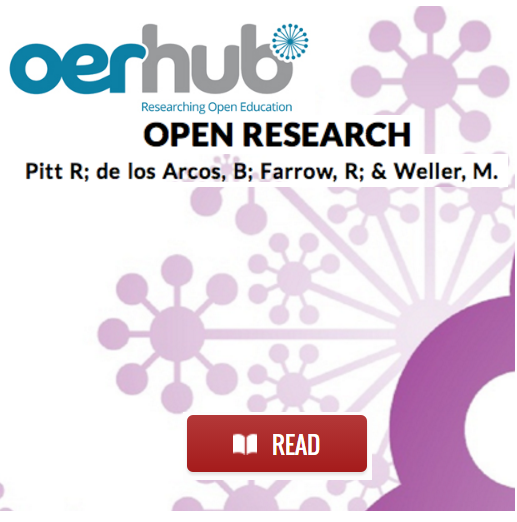OPEN RESEARCH Open Textbook. Reflect on Reflection
20/12/2016


In November 2016, the Open Education Research Hub (OER Hub) launched an open text book about open research. Besides the latter issue, the book focuses on ‘Ethics in the Open’, ‘Open Dissemination’ and ‘Reflecting in the Open’.
“Open Research is an open textbook based on the award winning course of the same name. The course ran two facilitated iterations during 2014 and 2015 on Peer 2 Peer University (P2PU). ‘Open Research’ was co-authored and delivered by the OER Hub team - leaders in open education research and open research practices” (OpenResearch-pressbooks).
Open research brings a range of different opportunities and challenges in the research process.
Working through the sections of the ’Open Research’ e-book, you will have a chance to understand what it means to do open research, what are some of the ethical issues that may arise from doing research in the open, and to know more about the benefits and shortcomings of public dissemination. In particular, the book will help you - in an interactive manner - explore and gain an understanding of:
|
What does openness mean to you and to others? What is open research and what kind of benefits could it bring? What kind of challenges might an open researcher encounter? Open tools you could use to help conduct your open research. How to structure your own open research project. |
|
From openness to novel research possibilities. Ethics as characteristic of a ‘good’ open researcher. Developing and applying ethical frameworks in traditional and open approaches across the life of a research project. Creating tools for evaluating ethical risks in a research project and identifying appropriate action(s). |
|
How open dissemination (e.g., open access) differs from traditional dissemination? The role that technology plays in open dissemination. Some of the benefits and disadvantages of open dissemination. Open licensing: Creative Commons licenses. |
|
Why open researchers reflect in the open? When to reflect on your own research? Who is involved in the context of evaluating an open project? Some tools to help reflect your own experience of being an open researcherю |
The e-book includes target activities, commentaries, video, audio transcriptions, references for further reading and Appendix.
|
OER Hub team would love for you to connect with it and keep in touch. OER Hub would also love to hear how you could utilize the material and your thoughts and ideas for extending and improving it. You can Email OER Hub: [email protected] Follow @OER_Hub on Twitter and use #openresearch If you are a graduate student with an interest in open education, consider joining the Global OER Graduate Network (GO-GN). Check out the OER World Map project. |
Reference:
Pitt, R. de los Arcos, B. Farrow, R and Weller, M. (2016). Open Research. OER Hub. Available from: https://openresearch.pressbooks.com. Open Research is licensed CC BY-SA 4.0
Related contents:
- Open Educational Resources: the future of Education, co-created with You (blog post on AIMS)
- OpenUP : a new EU-funded Open Science Project (blog post on AIMS)
- ‘The State of Open Data’ Figshare’s Report: global trends around Open Data (blog post on AIMS)
- Why openness benefits research (blogpost on Open Citations and Related Work)
- Open Research Glossary (Right to Research Coalition)
- What, exactly, is Open Science? (blog post on The Open Science Project)
- Open Data Institute platform
- Open Science Framework (OSF) platform
- Open Data for Development platform
- Open Research Exchange (the world’s first open-participation research platform for creating health outcome measurements)
- A full list of FAQ relating to open access (EIFL portal)
- Who are the open learners? A comparative study profiling. Non-formal users of open educational resources (article)
